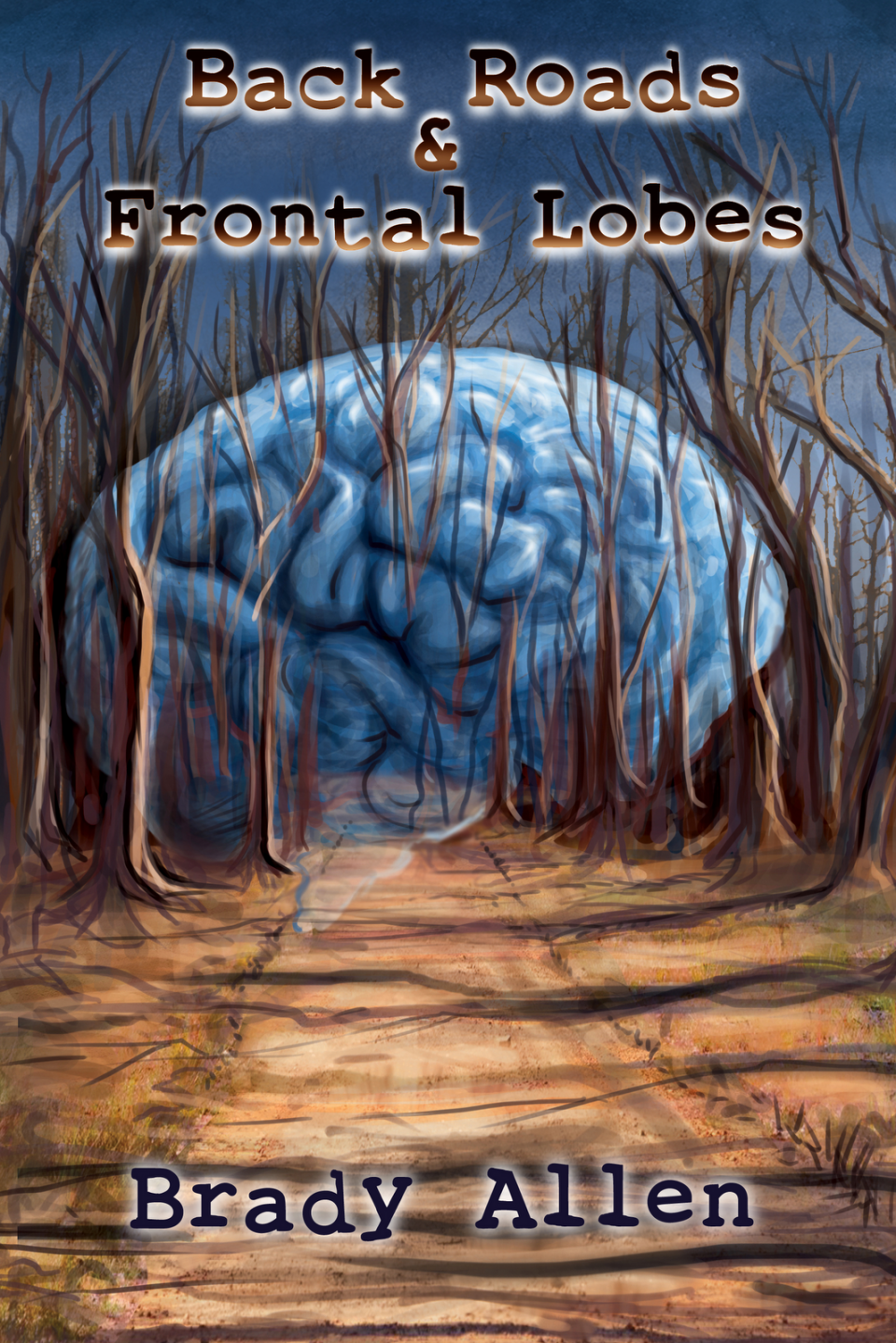Back Roads and Frontal Lobes by Brady Allen
Just in time for Halloween is my recommendation for a delightfully disturbing collection of short stories, Back Roads and Frontal Lobes by Brady Allen. Superbly crafted, seemingly effortless and wholly familiar, Allen’s characters are immediately recognizable (for better or worse), and ring true – which is part of why his stories are so chilling.
Allen hails from Dayton, Ohio and that state is the setting for many of his stories. (Someone remind me that if I am driving through Ohio and come across a town named Stairway Falls, under no circumstances should I stop for a cup of coffee at a diner, truck stop, gas station or café.) His Midwestern images are mundane and threadbare, with no evidence of “quaint”; these are the small towns from which there is no escape, with their dysfunction in full view.
Of course, the very first story, “Slow Mary”, hit me right in a very vulnerable Midwestern spot – the fear of hitting a deer while driving at night. From the opening paragraph, we are dropped smack dab in the middle of something that immediately puts us on edge:
There hasn’t been a moment this evening when Remy Arquette hasn’t been thinking about the deer, just as he is now, with night freshly dropped into the hills like a bomb that teases before detonation. He sits in a corner booth in the diner, Slow Mary’s, and the image of the deer and the smears of blood on the road rot away at his brain.
Regrettable, but not that out of the ordinary, you think. Not yet. But as the story progresses, Allen takes an already tense situation and pushes it, and pushes it, with touches both normal and freaky weird, until the ending punches you in the gut.
In fact, that seems to be Allen’s pattern – he keeps pushing. His starting points are diverse – going for normalcy here, immediately establishing the bizarre there, opening with a fantasy worthy of a young man’s wet dream or the hint of otherworldliness within the mundane – but where you are at the start of any of his stories is not where you are going to be at the end, and you can pretty much be sure that you are going to be in a deeper, darker, bloodier place at that end. But not always. That’s the kicker. Not always.
When Allen is brutal, he doesn’t hold back. “Shits and Giggles” makes Deliverance read like “Our Town”, and “Not Over Easy” is beyond disturbing. “The ‘ists After the Apocolypse” is as taunt and ugly as any zombie fiction (please let it always be fiction), “Praying” brings a whole new direction to life after the fallout, and “Porno Psalmody” is, well, just what you would expect of something titled “Porno Psalmody”.
Yet about the time you figure Brady Allen to be a blood and guts horror fiction writer (which he is), he turns around and shows a lighter touch; a wistfulness, a fleeting memory, or one that burns in a cauterizing way. For as much as Allen can evoke the bizarre and perverse, he also is a keen observer of the human condition that is just a tad bit left of center rather than being waaaay out there. A old blues musician (“Blues Bus to Memphis”), a hellcat dealing with loss (“Six Miles from Earth”), two lonely people finding a night of comfort together in a cheap hotel (“Small Square of Light”), even a tragic act of compassion (“Road Kill (A Love Story)”) still have a twist, even a sometimes violent one, but they also have something sweeter, more endearing, than expected. (My favorite, “Rounding Third”, will be especially touching for baseball fans out there.)
The point, though, is that none of these stories – even those that thematically contain the same characters – are like the others. Although loneliness and disconnect runs through virtually all of them, each takes on a different tone, a different tact, connected in the broad strokes but very different in theme, feel, sensation – and effect. One will leave a metallic taste in your mouth, one will scare you shitless, another will make you afraid to go outside. One will make you feel like you’re looking through a window at something very imitate, the next will make you desperately wish you hadn’t “seen” it at all. After one makes you cringe, another evokes relaxing on the porch with a glass of lemonade. Then the next one will be unabashedly grotesque, leaving you wondering why you ever let your guard down.
But every single one is masterfully written. Allen does not back away from what is ugly or horrifying, but he uses his images with intelligence and often with a wry sense of twisted humor; when he peels back the filters and shows us the ugly, it’s because the ugly is there lurking just under the surface, and we need to see it. He even has us wanting to see it, in some messed up, can’t-look-away way.
So if you like having your breath taken away by the visceral, by the profane, by the brutally horrifying, then pick up a copy of Back Roads and Frontal Lobes. Just make sure you read it in the daytime, in the sunshine – unless you don’t care about sleeping without nightmares, or listening for bumps in the night.
—Sharon Browning

